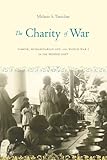The charity of war : famine, humanitarian aid, and World War I in the Middle East / Melanie S. Tanielian.
Material type: TextPublication details: Stanford, California : Stanford University Press, (c)2018.Description: 1 online resource (xiii, 350 pages) : illustrations, mapsContent type:
TextPublication details: Stanford, California : Stanford University Press, (c)2018.Description: 1 online resource (xiii, 350 pages) : illustrations, mapsContent type: - text
- computer
- online resource
- 9781503603776
- D638 .C437 2018
- COPYRIGHT NOT covered - Click this link to request copyright permission: https://lib.ciu.edu/copyright-request-form
| Item type | Current library | Collection | Call number | URL | Status | Date due | Barcode | |
|---|---|---|---|---|---|---|---|---|
 Online Book (LOGIN USING YOUR MY CIU LOGIN AND PASSWORD)
Online Book (LOGIN USING YOUR MY CIU LOGIN AND PASSWORD)
|
G. Allen Fleece Library ONLINE | Non-fiction | D638.43 (Browse shelf(Opens below)) | Link to resource | Available | ocn992437871 |
Includes bibliographies and index.
Introduction : total war: politics, power, and benevolence -- A city and its mountain, a mountain and its city -- Wartime famine : strategies, logistics, and catastrophe -- The politics of food : wartime provisioning for civilians -- Prayers and patrons : the politics of neutrality -- Rats, lice, and microbes : health provisions and sanitary space -- Local relief initiatives : civil society, women, and the state -- Beneficial benevolence : international wartime relief efforts -- Conclusion : Beirut 1919: the chaos of memory and politics.
With the exception of a few targeted aerial bombardments of the city's port, Beirut and Mount Lebanon did not see direct combat in World War I. Yet civilian casualties in this part of the Ottoman Empire reached shocking heights, possibly numbering half a million people. No war, in its usual understanding, took place there, but Lebanon was incontestably war-stricken. As a food crisis escalated into famine, it was the bloodless incursion of starvation and the silent assault of fatal disease that defined everyday life. The Charity of War tells how the Ottoman home front grappled with total war and how it sought to mitigate starvation and sickness through relief activities. Melanie S. Tanielian examines the wartime famine's reverberations throughout the community: in Beirut's municipal institutions, in its philanthropic and religious organizations, in international agencies, and in the homes of the city's residents. Her local history reveals a dynamic politics of provisioning that was central to civilian experiences in the war, as well as to the Middle Eastern political landscape that emerged post-war. By tracing these responses to the conflict, she demonstrates World War I's immediacy far from the European trenches, in a place where war was a socio-economic and political process rather than a military event.
COPYRIGHT NOT covered - Click this link to request copyright permission:
There are no comments on this title.
